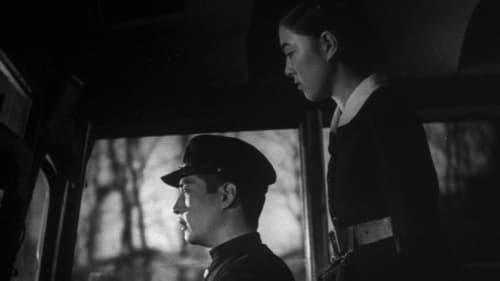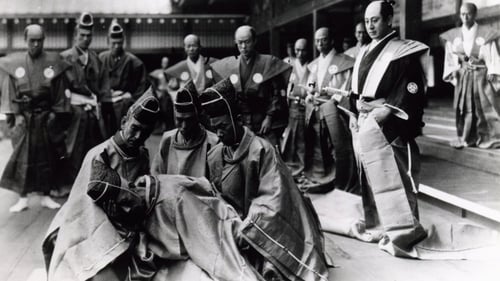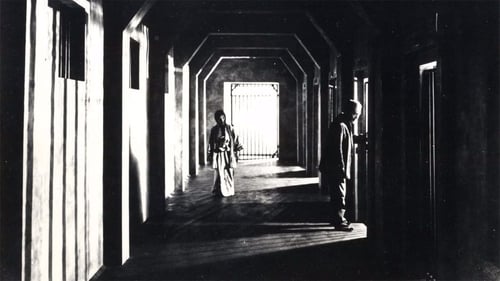Tetsu Tsuboi
Nascimento : , Tokyo, Japan

Based on the play ”Mabuta no haha” by famed author Shin Hasegawa, this is the first major starring role for Tomisaburo Wakayama. This heartfelt story concerns a wandering gambler from Banba by the name of Chutaro. Set during the Tenpo Period, Chutaro runs afoul of Boss Sukegoro of Iioka. Pursued by vengeance seeking swordsmen, Chutaro displays his phenomenal martial art skills. Abandoned as a child, he seeks to find his long lost mother, while at the same time fighting off numerous attacks by Iioka’s men.

A bar girl tries to pass her three children, each from a different father, to rural relatives.

Saheita, the final heir of a once rich and respectable family, can't refuse the many villagers that come to him for favours and money, even though he is on the brink of bankruptcy. Around town he is better known by his nickname Mr. Shosuke Ohara.

Tanuma Kandayuu is a high class samurai of the house of Nabeshima. He finds a lavish board of Go (a Chinese Board game) at Kinbei's store. He recommend Kinbei to offer it to his lord. Kinbei hesitates at first, since he knows the board has a mysterious legend surrounding it; it's believed that for every game played on the board, one death is required.

A wealthy family will not allow the military to grow crops on their fields due to their superstitious beliefs about their son's illness.

Inoue was something of a rarity in the sense, that he was a Shochiku house director who seems to have worked mostly in period films, often with big stars like Hasegawa or Bando. "Sumidagawa", named after the river that runs through Tokyo, is also a period film, but thematically a modern one. All the themes that you associate with the normal Shochiku women's films set in the present day are in this film, just in a different context: love, the planning of a marriage, career, family relations and societal melancholy. There is no action or swordplay.

Chikugomori Shindô
Este é um filme dividido em duas partes.
A primeira parte foi lançada originalmente no Japão antes do ataque a Pearl Harbor. O filme foi adaptado a partir da peça de Seika Mayama. A película desenvolve a crônicas do final da vida dos 47 Ronin, que tornaram-se (baseado historicamente) uma lenda na história japonesa.

dir: Teinosuke Kinugasa

Two cowardly palanquin carriers know the culprit of a murder but are too scared to report it to the police. In the mean time, an innocent man is arrested as the murderer and chaos ensues. Pre-war jidaigeki film.

Hermit
An onnagata (female impersonator) of a Kabuki troupe avenges his parents' deaths. Remade in 1963 as Yukinojô Henge.

Period film from 1934.

Hotate no Ushimatsu
The first half of the movie depicts a man's jealousy of his best friend and the woman he love. The second part depicts a hero who is ready to put the past behind him and risk his life for his friend.

A mournful masterpiece by Kinugasa Teinosuke


Gengoemon Kataoka
This 1932 adaptation is the earliest sound version of the ever-popular and much-filmed Chushingura story of the loyal 47 retainers who avenged their feudal lord after he was obliged to commit hara-kiri due to the machinations of a villainous courtier. As the first sound version of the classic narrative, the film was something of an event, and employed a stellar cast, who give a roster of memorable performances. Director Teinosuke Kinugasa was primarily a specialist in jidai-geki (period films), such as the internationally celebrated Gate of Hell (Jigokumon, 1953), and although he is now most famous as the maker of the avant-garde silent films A Page of Madness (Kurutta ichipeji, 1926) and Crossroads (Jujiro, 1928), Chushingura is in fact more typical of his output than those experimental works. The film ranked third in that year’s Kinema Junpo critics’ poll, and Joseph Anderson and Donald Richie noted that 'not only the sound but the quick cutting was admired by many critics.

Shinzaemon has been Sukeroku’s enemy ever since Sukeroku fought and defeated gangs from Shinzaemon’s group at a Kabuki theatre over Agemaki from Miuraya. Sukeroku swears that he will never draw his sword until he finds his family’s treasured blade, Tomokirimaru, so he gets insulted often by Shinzaemon’s men. Bunzaemon redeems Agemaki for Sukeroku ahead of Shinzaemon, but Sukeroku, ever the gentleman, does not accept. When Shinzaemon snatches Agemaki, it is found that he has Tomokirimaru.

Tsuta no Seikichi
First film adaptation of the kabuki play Benten Kozo, about a thief who steals from the rich and gives to the poor...

Crazy Man C
O filme conta a história de um marinheiro que se emprega como faxineiro em um manicômio para libertar sua esposa, que fora internada após uma tentativa de suicídio depois de ter afogado seu filho. Sem o uso de intertítulos e através de um sequência impressionante de imagens, é apresentada uma visão do mundo pelos olhos dos doentes mentais. Dado como perdido por mais de 40 anos, o filme foi recuperado pelo diretor em 1971, por uma cópia encontrada escondida em um vaso no galpão de seu jardim.












